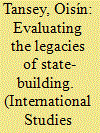| Srl | Item |
| 1 |
ID:
131008


|
|
|
|
|
| Publication |
2014.
|
| Summary/Abstract |
What impact do international state-building missions have on the domestic politics of states they seek to build, and how can we measure this impact with confidence? This article seeks to address these questions and challenge some existing approaches that often appear to assume that state-builders leave lasting legacies rather than demonstrating such influence with the use of carefully chosen empirical evidence. Too often, domestic conditions that follow in the wake of international state-building are assumed to follow as a result of international intervention, usually due to insufficient attention to the causal processes that link international actions to domestic outcomes. The article calls for greater appreciation of the methodological challenges to establishing causal inferences regarding the legacies of state-building and identifies three qualitative methodological strategies-process tracing, counterfactual analysis, and the use of control cases-that can be used to improve confidence in causal claims about state-building legacies. The article concludes with a case study of international state-building in East Timor, highlighting several flaws of existing evaluations of the United Nations' role in East Timor and identifying the critical role that domestic actors play even in the context of authoritative international intervention.
|
|
|
|
|
|
|
|
|
|
|
|
|
|
|
|
| 2 |
ID:
162227


|
|
|
|
|
| Summary/Abstract |
Repeated measurements of the same countries, people, or groups over time are vital to many fields of political science. These measurements, sometimes called time-series cross-sectional (TSCS) data, allow researchers to estimate a broad set of causal quantities, including contemporaneous effects and direct effects of lagged treatments. Unfortunately, popular methods for TSCS data can only produce valid inferences for lagged effects under some strong assumptions. In this paper, we use potential outcomes to define causal quantities of interest in these settings and clarify how standard models like the autoregressive distributed lag model can produce biased estimates of these quantities due to post-treatment conditioning. We then describe two estimation strategies that avoid these post-treatment biases—inverse probability weighting and structural nested mean models—and show via simulations that they can outperform standard approaches in small sample settings. We illustrate these methods in a study of how welfare spending affects terrorism.
|
|
|
|
|
|
|
|
|
|
|
|
|
|
|
|